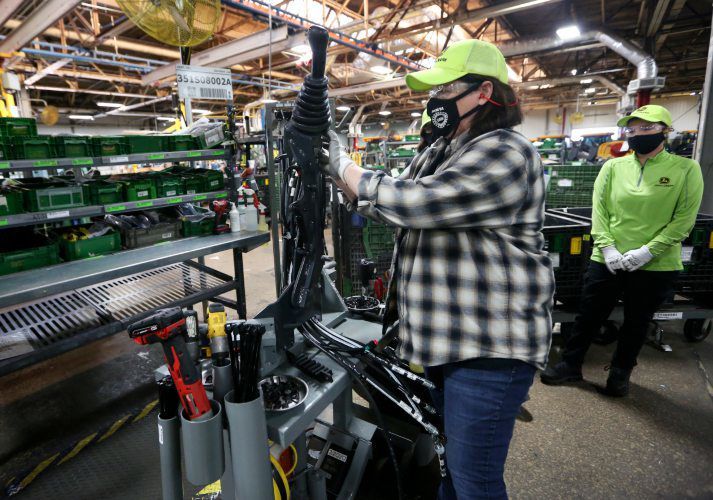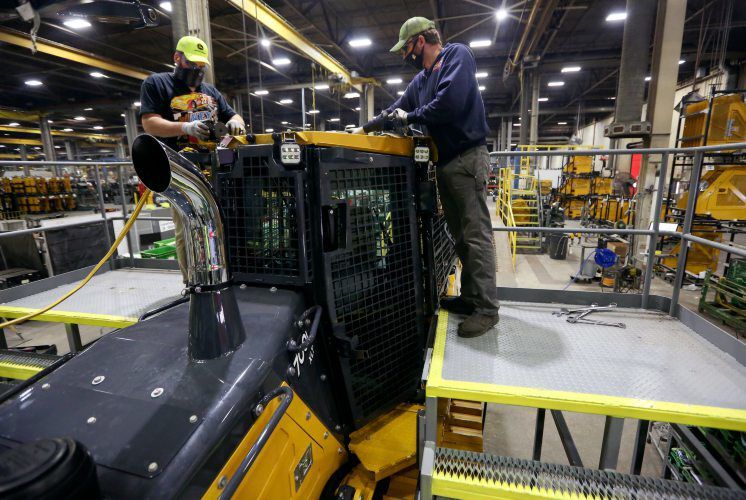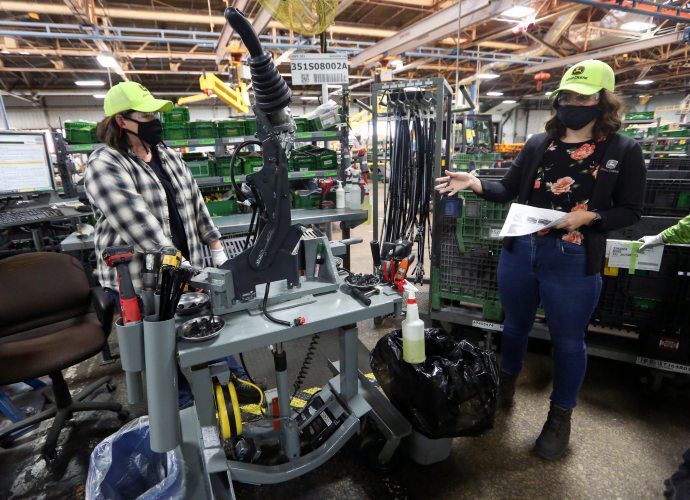When John Deere Dubuque Works makes headlines, they are typically associated with the rollout of a new product or the announcement of quarterly earnings.
But employees at the Dubuque facility will tell you that the end results don’t tell the full story.
For the past two decades, the developments unfolding behind the scenes have been lifted up by an important process.
Deere launched its Continuous Improvement program in 2000, and the initiative has continued to have a significant impact since.
“It is about improving quality, safety and efficiency,” explained Chris Ernst, CI coordinator for John Deere Dubuque Works.
With about 2,700 employees, John Deere Dubuque Works is the largest employer in Dubuque County.
The CI program is a partnership between John Deere Dubuque Works and the United Auto Workers, a union representing manufacturing workers at the plant. Deere locations, including the one in Dubuque, are processing — which means considering or completing — more than 20,000 CI projects annually.
The program recently was recognized by Fast Company magazine, a national publication that named Deere as one of the best workplaces for innovators in 2020.
Vaughn White, CI coordinator for UAW, said one of the most important things about the initiative is the message it sends to workers.
Even if a suggested change isn’t implemented, he noted, supervisors consider the issues raised and follow up with the employee who submitted the request.
“That follow-through is just so important to making sure the overall process works,” White said. “It lets the workers know if they have an idea, something is going to get done.”
MAKING AN IMPACT
All across the factory floor, there are examples of the program’s impact.
At one work station, workers assemble pilots, the portion of backhoes that allow users to steer and operate the machinery.
Recently, employees noticed that the process for constructing these critical devices was inefficient: Workers often were bending down or reaching upward to put pieces together, slowing the process and increasing the physical strain on employees.
An employee brought attention to the issue through the CI program, and a solution ultimately was devised. Now, employees used a lift table — a surface that can be adjusted up and down — to make sure the pilot is being constructed at an ideal height.
Assembler Ellie Jaeger is among the many employees benefiting from the change.
“I can’t imagine doing it without this,” she said.
Across the factory, where the company constructs forestry equipment, the impact of the CI program also is evident.
Many of the forestry machines are equipped with “limb risers,” which push aside branches as the equipment rumbles through the woods.
The installation of limb risers was introduced recently to the Dubuque factory, but workers initially found the process to be tiresome and inefficient. In many cases, they’d have to climb on the tracks or step on the cab to install the equipment.
Employees Tim Schreyer and Tom Ochs addressed the inefficiency.
“I thought we needed to come up with a new plan for this,” said Ochs.
Led by their suggestions, Dubuque Works created a new platform, complete with steps, that allows workers to walk up to the side of the forestry machine and install the limb riser.
“It’s a lot more efficient and a lot safer now,” said Ochs.
FINDING EFFICIENCIES
Within the Dubuque Works facility, large bulletin boards provide a visual representation of the ongoing progression of CI projects.
Each idea goes through four basic steps: An employee posts an idea to a board in their section of the factory; within 48 hours, a supervisor or other company official will follow up with the employee; company officials explore the issue and examine proposed fixes; and finally, a solution is presented to the employees.
Mark Onderick, a labor relations manager with Deere, believes this process has tangible benefits.
“I think it does two things,” he said. “It gives people a very defined avenue to make their idea heard, and it also ensures there is accountability, that there will be a conversation with the employee about each idea.”
Chad Kaiser, president of UAW Local 94, agreed.
“Every issue cannot be addressed, but at least it forces the conversation,” he said.
Chris Taylor, who serves as the factory-level Continuous Improvement representative at Dubuque Works, emphasized that the program translates to increased efficiencies that ultimately make tangible impacts on the kind of work conducted at the factory and, by extension, the number of jobs housed there.
Achieving great efficiencies on one project often frees up time and space to bring in another, he said.
“It has brought a lot of work into Dubuque Works,” he said. “That means more job security, growing numbers in the workforce and more hiring opportunities.”




